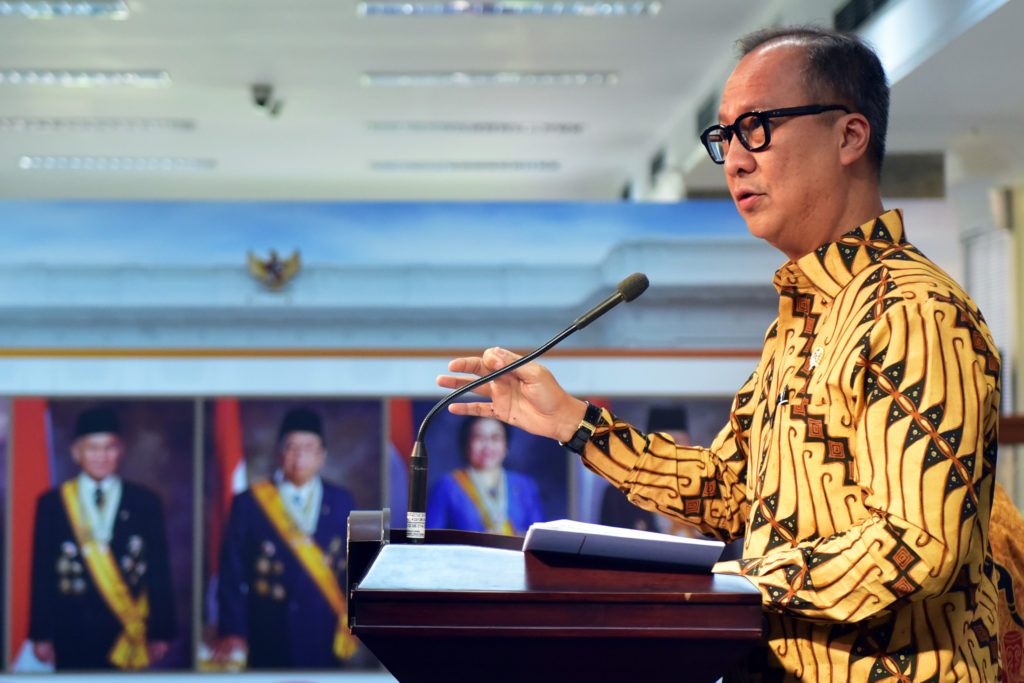Minister: Increase National Steel Industry Utilization to Curb Import

Minister of Industry Agus Gumiwang Kartasasmita delivers a press statement after a Limited Meeting at the Presidential Office, Jakarta, Wednesday (12/2). (Photo by: Rahmat/PR)
Increasing utilization rates and downstream processing of local steel industry will lead to a reduction in dependency on raw materials imports, according to Minister of Industry Agus Gumiwang Kartasasmita.
“First, we need to increase utilization rates of national manufacturing companies to meet and supply the demand of raw materials of steel downstream industry,” the Minister said during a press conference after a Limited Meeting at the Presidential Office, Jakarta, Wednesday (12/2).
Local steel industry is now utilizing only about 50 percent of its capacity, Agus added, partly because companies cannot keep up with the competition of imported products particularly in terms of price and quality.
“The most important thing is to push the steel industry, both State-owned Enterprises and private companies, to update their technologies,” he stated.
The Minister went on to say that Indonesia has a great potential for iron sand deposits but it cannot be processed because the national steel industry do not have the technologies to do that. For the reason, the industry must have political will to update the technology.
“Second, we need to implement policies on antidumping duty (BMAD) and Indonesian National Standard (SNI). The SNI (policy) must be drafted and imposed accurately,” he said.
According to Agus, national steel industry must increase the capacity and supply 70 percent of domestic steel product demand. “Regarding the remaining 30 percent, there is no local manufacturing company that can fulfill it,” he said adding that by increasing utilization of national steel industry, raw material imports will be reduced so that steel import regulation is imposed only to maintain domestic supply.
On that occasion, the Minister also stated that slag should no longer be categorized as waste because Environmental Protection Agency (EPA) has assessed that iron and steelmaking slags are non-hazardous. “We need to follow the best international practice,” he added.
In the European Union and Japan, steelmaking slags are reprocessed or recycled for a circular economy. Thus, the Limited Meeting has agreed that steelmaking slags will no longer be categorized as waste and can be used to support a circular economy.
Regarding steel billets, the Minister also called for relaxation in the import of scrap metal to support downstream industry since the national industry is currently experiencing a deficit in metal scrap as a supporting material for production. Currently, Indonesia has only been able to import 4-5 million tons of metal scrap. In fact, he said, the national industry needs 9 million tons of metal scrap per year. As a result, the industry must import steel billets at a higher price.
In addition to meet the industry demand, the import of metal scrap is also projected to reduce trade balance deficit. It is because local manufacturers must spend US$100 more to import steel billets than produce their own billets domestically by using raw metal scrap material.
With a total importation of billets of 4 million tons, the potential trade deficit will be US$400 million per year. Therefore, the Limited Meeting has agreed that relaxation will be applied to the import of scrap metal. (TGH/EN)
Translated by : Rany Anjany
Reviewed by : Mia Medyana








